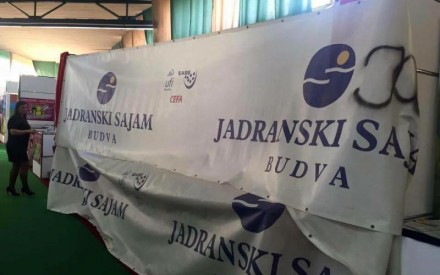
Montenegrin police covered the exposition with tarp following Abkhazia’s refusal to remove it from the fair (Chamber of Commerce of the de-facto Republic of Abkhazia)
Abkhazia accuses Georgia of pursuing a policy of isolation and puts a question mark on the restitution of the IPRM, while Georgia points towards individual countries’ policies of non–recognition of Abkhazia.
The de facto Ministry of Foreign Affairs of the de facto Republic of Abkhazia issued a statement ‘categorically condemning’ Georgian attempts at international isolation of Abkhazia.
Abkhazia was taking part in an international tourism fair METUBES 2016 held from 21 to 23 April in Budva, Montenegro. Following a complaint from Georgia’s MFA, Montenegrin police shut down the Abkhazian exposition and covered it with tarp.
Abkhazia’s MFA wrote in its statement that Georgia’s policy of preventing Abkhazia’s participation in international events might hinder the peace process and influence the process of resuming the work of the Incident Prevention and Response Mechanism (IPRM).
IPRM is a mechanism set up by the OSCE and the EU Monitoring Mission in 2008 allowing representatives of Georgia and the breakaway states to meet and discuss issues related to human security in border areas. Representatives of the governments in Tbilisi and Tskhinvali meet on a regular basis in the village of Ergneti which is located right at the de facto border. Sukhumi withdrew its participation in the mechanism following a series of controversial comments by the EUMM’s head in 2012.
‘Georgian attempts to counter any humanitarian, cultural, sporting and commercial initiatives of the Republic of Abkhazia abroad demonstrate Georgia’s inability to recognise the existing political realities and maintain relations with the Abkhaz side in a civilized manner. Georgia should finally understand that it will not manage to build a “Berlin Wall” around Abkhazia in the 21st century. We call on the Georgian government to stop the anti-Abkhazian activities and focus on ways of settlement of the Georgian–Abkhaz relations, including in the framework of the Geneva discussions on security and stability in Transcaucasia. For its part, the Abkhaz Foreign Ministry declares that Georgia’s provocative actions will not remain without response, and cannot, but influence the process of resuming the work of the Incident Prevention and Response Mechanism (IPRM)’, the statement by Abkhazia’s MFA reads.
Abkhazia’s MFA also harshly criticised the government of Montenegro, which ordered the shutdown despite previously allowing Abkhazia to participate in the fair, and announced a ‘possibility of legal response’.
‘The Montenegro government’s position is puzzling, which issued permit to the Chamber of Commerce of Abkhazia to participate in the exhibition, and followed the tastes of the Georgian side and rudely demanded from the Abkhazian delegation to leave the exhibition centre. Instead of supporting the efforts of the newly independent Republic of Abkhazia to establish and develop relations with European countries, the state of Montenegro, which itself has been recognized a decade ago, indulge anti-Abkhazian Georgian actions aimed at the isolation of Abkhazia. In this regard, the Abkhaz Foreign Ministry is considering the possibility of legal response to the unfriendly actions of the Montenegrin side’, Abkhazia’s MFA wrote in its statement.
In her comment for DF Watch, the deputy minister for reconciliation and civic equality, Ketevan Tsikhelashvili stressed that the Georgian side couldn’t affect the way the Montenegrin authorities decided to handle the situation.
‘Georgia’s territorial integrity and sovereignty is internationally respected, so individual countries undertake their own measures against activities which compromise their non-recognition policy [of Abkhazia], sometimes even without a Georgian request. Indeed, in some cases it’s Georgia’s Foreign Ministry or other relevant governmental organ which requests an official clarification. In this particular case, I still don’t know whether there was a clear request, but it’s not surprising as the case involved the issue of [Abkhazia’s] status. In the statement made by the de facto authorities, there was a comment on the way [the Abkhazian exposition] was abolished. Nobody here can or does instruct different states what kind of measures they should undertake. It’s every state’s sovereign domain. I think that the way the issue was handled was the source of the frustration in that statement’, Ms Tsikhelashvili told DF Watch.
Ms Tsikhelashvili also pointed out that bringing up the issue of restoring the Incident Prevention and Response Mechanism was an act of blackmail.
‘IPRM has been on hold for the past four years. The mechanism has nothing to do with what’s happening on the other side. I simply didn’t understand this message, which was an attempt to blackmail [the process of restoring] the IPRM. The Abkhazian authorities know very well that there is a non-recognition policy and that the international community, with the exception of Russia and the handful of other states, recognises Georgian sovereignty over this territory. I find the issue of IPRM unrelated’, Ms Tsikhelashvili noted.
Abkhazia already participated this year in international tourism fairs in France, Hungary and Russia.
In October 2015, after an intervention on behalf of Georgia’s MFA, Abkhazian sportsmen were prevented from participating in an international freestyle wrestling tournament in Yerevan.
In April 2013, the Abkhazian children’s ensemble, Abaza, refused to participate in the International Children’s Festival in Turkey after the organisers altered the programme in a way which said that Abkhazia was an autonomous republic in Georgia, on official Georgian request.
In June 2013, Poland refused to grant visas to the members of the ensemble. According to the statement by Poland’s MFA, Russian passports issued in Abkhazia were not valid documents for applying for visas.





Leave A Comment
You must be logged in to post a comment.